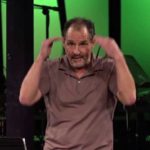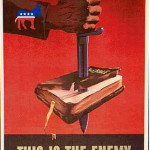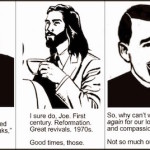We run our website the way we wished the whole internet worked: we provide high quality original content with no ads. We are funded solely by your direct support. Please consider supporting this project.
Christian Utopia
Fergal of Claddagh, OP via Compfight
A little meditation on Christian Utopia and the Body Politic as we stand poised on the eve of the election in America. We affirm that Jesus will indeed “establish His kingdom on earth” but it won’t come through the exercise of power. Rather, God’s kingdom will come as his people imitate his self-sacrificial willingness to serve.
From the blog:
This brand of Christianity comes from the idea that God will establish His kingdom on earth. It will be established through human power and might leading to a form of theocracy in which the Christian God will rule their nation through divinely elected Christian men and women. This is the very same ideology that permeated 1st century Judaism as they waited in eager anticipation for their prophesied Messiah to deliver them from the great oppressor and establish a great Jewish utopia. When Jesus the true Messiah came to Jerusalem not on a majestic steed with pomp and circumstance, but instead on an obscure colt with only a few ragtag disciples trailing behind, the Jews were most assuredly disappointed. Only later did they witness this Jewish King being flogged and ultimately executed upon a Roman instrument of death known as a cross. Little did they know that the Kingdom of God was indeed in their midst. But, the way in which Jesus became King and Lord over all was not by might, power, and politics, but through the sheer love, grace, truth, peace, sacrifice, and service toward others. Not a single sword was raised, nor a single political action signed; His kingdom was ushered in by individuals willing to love and serve others at the expense of sacrificing their own lives just like their King.
Category: General
Tags: Kingdom Living, Politics
Related Reading

Remembering that We are Finite
Here’s a little reminder from Joshua Becker that we live with limited resources in the areas of “Money. Time. Energy. Attention. Physical Space. Relationships. Mental Capacity. Body. Talents. Natural Resources.” Let’s spend these things with wisdom and love. From the blog: This reality of our finiteness is an incredibly important truth. It is one we should intentionally choose to focus on…

When We Talk Politics
In this clip, Greg identifies a source of much of the conflict we experience in our conversations about politics, or other important topics. He does this by introducing the phrase, “your map is not the territory.” Your brain assembles and interprets the sensations you experience and forms maps of the world based upon those experiences.…

How Are We To Love the Soldiers of ISIS?
Over the last several weeks I’ve received some form of this question almost every day. In some cases the question is asked rhetorically, as though the very question exposes the absurdity of suggesting we are to love this terroristic group. Other times the question is asked with a pragmatic twist. One person recently said to…

Politics & the Kingdom of the World
Instead of aligning any version of the kingdom of this world with the kingdom of God—as is common in American Christianity—kingdom-of-God participants must retain a healthy suspicion toward every version of the kingdom of this world. This is especially necessary regarding one’s own version because that’s precisely where we’re most tempted to become idolatrous (see…

“Pulpit Freedom Sunday” and the Call to Politicize the Pulpit
Religion Dispatches online magazine shared an article in which conservative evangelical leaders are calling on pastors to dare the government to sue them by using their pulpit to speak out against Obama and other “ungodly” candidates. They are hosting “Pulpit Freedom Sunday” on October 7th in an effort to shame pastor’s “timidity” and get them to…


